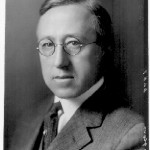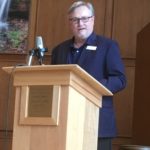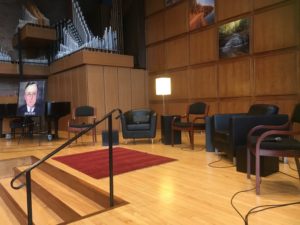In 1916, a few months shy of the U.S. entry into World War I, when the theory of evolution was still a controversial concept in religious institutions, Rev. John Dietrich was invited to become the minister at First Unitarian Society of Minneapolis (FUS). He had been a popular minister in Pittsburgh, who doubled membership and tripled attendance in the early 1900s, but was defrocked by the Reformed Church for denying the virgin birth and infallibility of the Bible.
The role of the church, Rev. Dietrich felt, was to teach. His Sunday talks became hour-long addresses preceded by readings, music, and a statement of aspiration. “I believe in all seriousness,” he told his congregation, “that I am a minister, not of America nor of Minneapolis nor of Unitarianism, nor even of this society, but of Righteousness.” Yet he insisted that he would “never try to impose” his religious approach upon the congregation. “I shall rather try to stimulate and guide you in your thinking that you may work out your own conceptions of religion and mortality.”
One hundred years later, FUS celebrated the centennial of the Dietrich legacy by hosting a conference on “The Future of Humanism.” Following are excerpts and random observations from those conversations, as well as the address on October 16 by Dr. Anthony Pinn.
About Anthony Pinn
Previously a young minister in New York and Boston, Anthony Pinn left traditional religion after recognizing that the Bible and belief in a heavenly afterlife was doing nothing to help young parishioners cope with drugs, poverty and inequity in their community. There was a harshness in the world that religion was not addressing, other than to promise a better life later.
James Baldwin and Richard Wright offered hope that by controlling words well we could lead to a rethinking of the world – by communicating strong ideals it could usher in a new way of life. So, in the 1980s, Pinn invited youth in his community to capture their ideas for a better future. What they shared, however, was about a demise of hope — about surviving rather than thriving, in communities where kids wore shoes into neglected pools to protect themselves from broken glass.
“How can you learn if you’re hungry? Where is the aspiration in a life withered by exposure to crack cocaine? Where is hope when those stacking bills are drug dealers, not those working 9 to 5?”
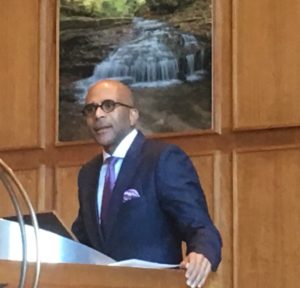 It was an uncomfortable paradox and tension. Pinn the minister realized, “I had nothing in response.” Finding no answers in traditional religion anymore, “I opted out of the dance.”
It was an uncomfortable paradox and tension. Pinn the minister realized, “I had nothing in response.” Finding no answers in traditional religion anymore, “I opted out of the dance.”
He left the ministry and became a tenured professor of religious studies — only to be eventually defrocked himself after certain colleagues decided his atheistic beliefs made him unqualified to teach religion. FUS became the first to invite him to speak about his story. A decade later — now founding director of the Center for Engaged Research and Collaborative Learning, professor of African American Religion at Rice University, and 2006 “Humanist of the Year” by Harvard University — Pinn returned to celebrate 100 years of Humanist thinking in Minneapolis.
About the Conference (random insights)
The overarching question of the conference was about the role of Humanism as a kind of non-theistic “ministry.” What are the strengths, challenges and future?
One general theme in the day was that Humanism serves to poke holes in existing narratives…. and to redefine through critical thinking and collaboration. A few of the ideas shared:
- Insist on a shared life in a shared world.
- “Religion is crap” is not all we need to hear. There are battered populations who need a soft space to land. For some, the price of connection is listening to a sermon you don’t always agree with.
- Walk through differences, not around them.
- Two philosophies: “We are screwed up and need to be taught,” or “There is a human capacity to connect and get to work.”
- It’s important to remain engaged in hard conversations. That’s how we learn and are challenged. It’s important not only to be with the like-minded.
- Atheism is the unique space where Karl Marx and Ayn Rand join hands.
- Quoting Lorraine Hansberry’s “A Raisin the Sun” — “It’s just that I get tired of [God] getting credit for all the things the human race achieves through its own stubborn effort.”
- Issues of race/gender/class — might be how defined, but not how confined. How do I perceive myself, not just how other people perceive me.
- Humanism as part of a growth process, not about finding answers, or even consensus. Using our own unique perspectives in a modern-day Socratic dialogue. Finding goodness without God, in each other. For some, searching for a collective way to impact policies.
- Blending in is a luxury. What invisibility are we willing to give up to enter a world that is more uncertain?
-
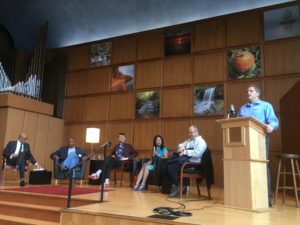
FUS Board President Phil Duran announces November 1, 2016, as Rev. John Dietrich Day, by proclamation of the City of Minneapolis
Many of us base knowledge and security on being able to reason ourselves out of conflict, without recognizing the emotions of why others believe what they believe.
- We get passionate about global issues like climate change, without understanding what is happening five miles away, like lead poisoning disproportionately affecting people of color.
- Education is not about testing well. It’s about interrogating life, community, nation, world. Expand our ideas of education beyond the classroom and set the standard higher.
- Question the affordability of housing stock.
- We can all be socialized to good or bad.
- If a role of religion is to alleviate suffering of others, why is Death With Dignity/Compassionate Care for end-of-life decisions in the hands of someone else’s religious “rule” — not about being able to follow one’s own heart? Where is the morality in that?
- Is it godless to pursue critical thinking?
- Shouldn’t reparations be not about blaming individuals or even institutions, but we as a country taking responsibility for communal injustice?
Specific Voices (a short sampler)
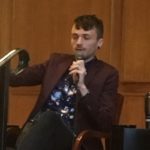 Yale Humanist Chaplain Chris Stedman: Breaking out into wider collaborations is critical. We’re not good at institution building, yet that’s how we organize and come into spaces with others, where we remind ourselves of our commitments and the opportunities to act on our values. If we were to step into the traditions of another Humanist community, where are our touchstones?
Yale Humanist Chaplain Chris Stedman: Breaking out into wider collaborations is critical. We’re not good at institution building, yet that’s how we organize and come into spaces with others, where we remind ourselves of our commitments and the opportunities to act on our values. If we were to step into the traditions of another Humanist community, where are our touchstones?
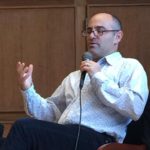 Theorist of secularism Phil Zuckerman (Pitzer College): How do humanists replicate the traditions, for example, of the shared heritage of the Jewish community? A legacy that transcends generations and connects us with ancestors… We walked away from religion, yet a small minority of us bother to care, mull, talk, label and gather together at a conference like this. We’re unique, with an opportunity to shape our future, because Humanism matters to us.
Theorist of secularism Phil Zuckerman (Pitzer College): How do humanists replicate the traditions, for example, of the shared heritage of the Jewish community? A legacy that transcends generations and connects us with ancestors… We walked away from religion, yet a small minority of us bother to care, mull, talk, label and gather together at a conference like this. We’re unique, with an opportunity to shape our future, because Humanism matters to us.
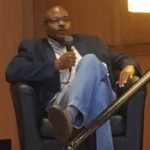 Professor of religion William Hart (Macalester): Speaking as someone in a mixed marriage with a religious wife and daughter, himself an atheist and naturalist, with a basically fundamentalist family background — in reality, how can we expect to have deeply shared values? Among us are Libertarians, for example, who have a different viewpoint about what we owe each other as a society. The individualism of Humanism makes us particularly vulnerable/open to not having shared points of view.
Professor of religion William Hart (Macalester): Speaking as someone in a mixed marriage with a religious wife and daughter, himself an atheist and naturalist, with a basically fundamentalist family background — in reality, how can we expect to have deeply shared values? Among us are Libertarians, for example, who have a different viewpoint about what we owe each other as a society. The individualism of Humanism makes us particularly vulnerable/open to not having shared points of view.
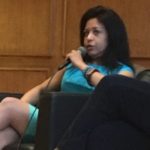 Feminist scholar Sonita Sarker (Macalester): We are good at bean counting – compartmentalizing based on race, gender, class. Yet compartmentalizing is what we are trying to fight. We might think that getting diverse voices into a room makes the difference, but not if we’re don’t talk about our differences… Living in a capitalistic society, we’ve been taught that everything/everyone is an object to be consumed — we look for the instant gratification.
Feminist scholar Sonita Sarker (Macalester): We are good at bean counting – compartmentalizing based on race, gender, class. Yet compartmentalizing is what we are trying to fight. We might think that getting diverse voices into a room makes the difference, but not if we’re don’t talk about our differences… Living in a capitalistic society, we’ve been taught that everything/everyone is an object to be consumed — we look for the instant gratification.
Moderator Stephanie Zvan, Humanist Hour podcast: Let’s not be too comfortable with our identity… values… voices… elitism… institutions… history. Let’s live in the uncomfortable space of uncertainty… anger… mystery… not having the answers… perpetual change… losing control as we grow.
Summarized address of Anthony Pinn
for the full podcast of his October 16 address, click here
Living in the tension is where imagination and creativity can spring. The paradox of “feeling good” despite all the mess of the world, the complexity of living in an imperfect world with multiple perspectives on what can be done to right the wrongs — when even the wrongs are defined differently — is where we live our humanism.
For the African-American community, after the civil rights movement made headway in the 1960s, and people worked hard and played by the rules and lived in respectability to create a better life for their children, they could see by the 1980s that things weren’t shifting much for them. Now in 2016, with the “same old same old” that disappoints so many as we see who is jailed and who is not — an impatience growing with waiting for heaven to balance the scales — Pinn the atheist sees Humanism as the space not for theological answers, or even being an opening to the mysteries, but as a place for connection, where we catch our breath together as we do the work that society needs.
Don’t give me color blindness, Pinn said. For him, living in a black body, where there is no guarantee that certain behaviors will keep you safe from the police — for whom buying a car has to be considered not only for cost but for what kind of unwanted attention he might get driving it on certain streets — understanding the differences of our experiences is vital.
Goals: Rigorous dialogue that pokes holes in the narrative. Don’t let assault and inequity stand unchallenged. Force confrontation with the comfortable mainstream storyline. Don’t rely on rationality to protect us — keep in mind, for example, the paradox that a “humanistic” hero like Thomas Jefferson, who believed in the separation of church and state, also believed in slave ownership and assault. Recognize shortcomings and vulnerabilities.
By seeing how black lives don’t matter, and by not demanding easy answers, Pinn sees the Humanist life as one that doesn’t solve all the world’s problems, but as each of us doing what we can where we are — maximizing our potential.
As his grandmother used to tell him, “Move through the world knowing your footsteps matter.”
